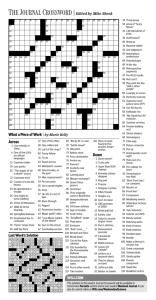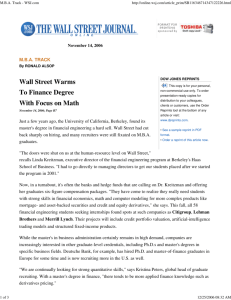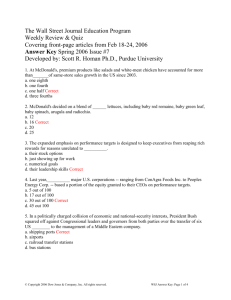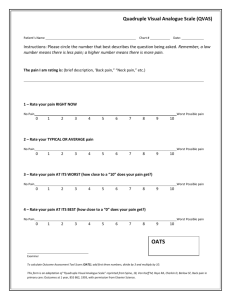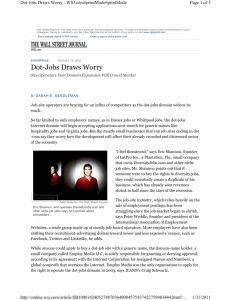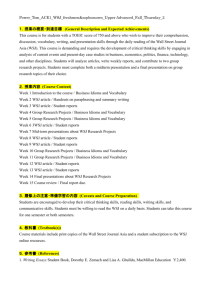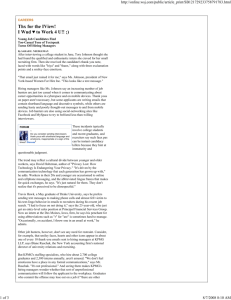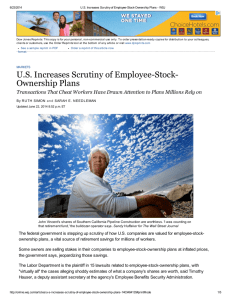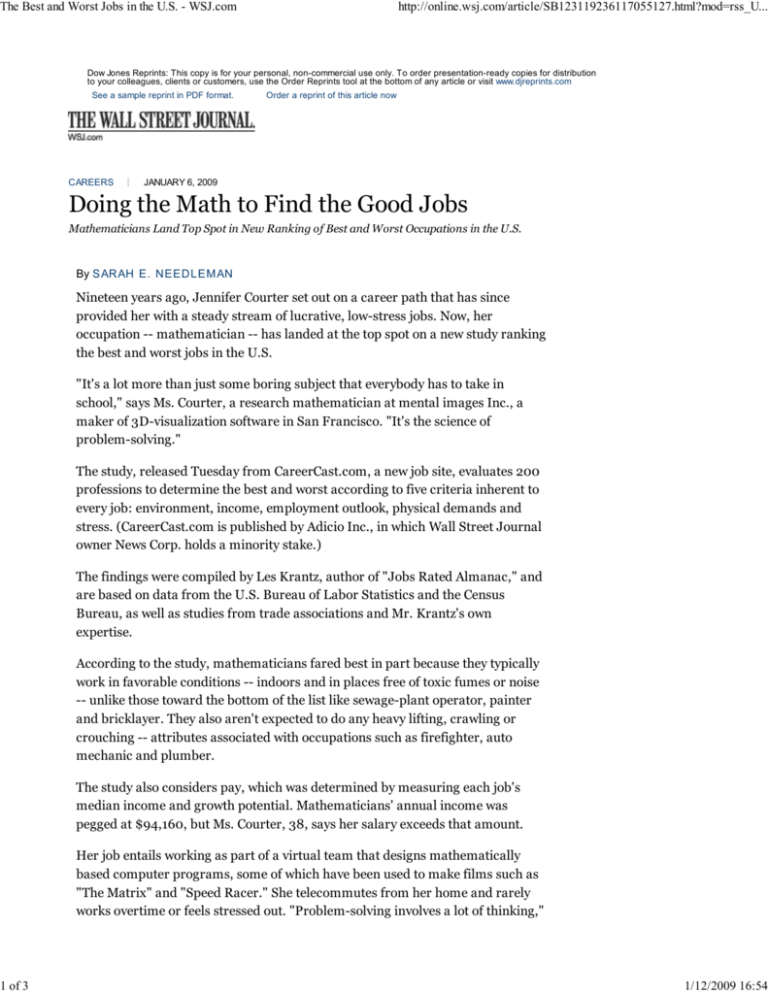
The Best and Worst Jobs in the U.S. - WSJ.com
1 of 3
http://online.wsj.com/article/SB123119236117055127.html?mod=rss_U...
Dow Jones Reprints: This copy is for your personal, non-commercial use only. To order presentation-ready copies for distribution
to your colleagues, clients or customers, use the Order Reprints tool at the bottom of any article or visit www.djreprints.com
See a sample reprint in PDF format.
CAREERS
Order a reprint of this article now
JANUARY 6, 2009
Doing the Math to Find the Good Jobs
Mathematicians Land Top Spot in New Ranking of Best and Worst Occupations in the U.S.
By SARAH E. NEEDLEMAN
Nineteen years ago, Jennifer Courter set out on a career path that has since
provided her with a steady stream of lucrative, low-stress jobs. Now, her
occupation -- mathematician -- has landed at the top spot on a new study ranking
the best and worst jobs in the U.S.
"It's a lot more than just some boring subject that everybody has to take in
school," says Ms. Courter, a research mathematician at mental images Inc., a
maker of 3D-visualization software in San Francisco. "It's the science of
problem-solving."
The study, released Tuesday from CareerCast.com, a new job site, evaluates 200
professions to determine the best and worst according to five criteria inherent to
every job: environment, income, employment outlook, physical demands and
stress. (CareerCast.com is published by Adicio Inc., in which Wall Street Journal
owner News Corp. holds a minority stake.)
The findings were compiled by Les Krantz, author of "Jobs Rated Almanac," and
are based on data from the U.S. Bureau of Labor Statistics and the Census
Bureau, as well as studies from trade associations and Mr. Krantz's own
expertise.
According to the study, mathematicians fared best in part because they typically
work in favorable conditions -- indoors and in places free of toxic fumes or noise
-- unlike those toward the bottom of the list like sewage-plant operator, painter
and bricklayer. They also aren't expected to do any heavy lifting, crawling or
crouching -- attributes associated with occupations such as firefighter, auto
mechanic and plumber.
The study also considers pay, which was determined by measuring each job's
median income and growth potential. Mathematicians' annual income was
pegged at $94,160, but Ms. Courter, 38, says her salary exceeds that amount.
Her job entails working as part of a virtual team that designs mathematically
based computer programs, some of which have been used to make films such as
"The Matrix" and "Speed Racer." She telecommutes from her home and rarely
works overtime or feels stressed out. "Problem-solving involves a lot of thinking,"
1/12/2009 16:54
The Best and Worst Jobs in the U.S. - WSJ.com
2 of 3
http://online.wsj.com/article/SB123119236117055127.html?mod=rss_U...
says Ms. Courter. "I find that calming."
Other jobs at the top of the study's list include actuary, statistician, biologist,
software engineer and computer-systems analyst, historian and sociologist.
Mark Nord is a sociologist working for the Department of Agriculture's
Economic Research Service in Washington, D.C. He studies hunger in American
households and writes research reports about his findings. "The best part of the
job is the sense that I'm making some contribution to good policy making," he
says. "The kind of stuff that I crank out gets picked up by advocacy organizations,
media and policy officials."
The study estimates sociologists earn $63,195, though Mr. Nord, 62, says his
income is about double that amount. He says he isn't surprised by the findings
because his job generates little stress and he works a steady 7:30 a.m. to 4 p.m.
schedule. "It's all done at the computer at my desk," he says. "The main
occupational hazard is carpal tunnel syndrome."
On the opposite end of the career spectrum are lumberjacks. The study shows
these workers, also known as timber cutters and loggers, as having the worst
occupation, because of the dangerous nature of their work, a poor employment
outlook and low annual pay -- just $32,124.
New protective gear -- such as trouser covers made of fiber-reinforcement
materials -- and an increased emphasis on safety have helped to reduce injuries
among lumberjacks, says Paul Branch, who manages the timber department at
Pike Lumber Co. in Akron, Ind. Still, accidents do occur from time to time, and
some even result in death. "It's not a job everybody can do," says Mr. Branch.
But Eric Nellans, who has been cutting timber for the past 11 years for Pike
Lumber, is passionate about his profession. "It's a very rewarding job, especially
at the end of the day when you see the work you accomplished," he says. Mr.
Nellans, 35, didn't become discouraged even after he accidentally knocked down
a dead tree and broke his right leg in the process four years ago. "I was back in
the woods cutting timber in five weeks," he says.
Other jobs at the bottom of the study: dairy farmer, taxi driver, seaman,
emergency medical technician and roofer.
Mike Riegel, a 43-year-old roofer in Flemington, N.J., says he likes working
"outside in the fresh air." Since he runs his own business, which he inherited
from his father, he can start and end his day early in hot weather or do the
opposite when it's cold.
The study estimates roofers earn annual incomes of $34,164, which Mr. Riegel
says is consistent with what he pays new employees. Roofers also ranked poorly
because of their hazardous working conditions. "You obviously can't be afraid of
heights," says Mr. Riegel, who once fell two stories while working on a rooftop in
the rain but luckily landed safely on a pile of soft dirt. "I missed some cement by
10 feet."
1/12/2009 16:54
The Best and Worst Jobs in the U.S. - WSJ.com
3 of 3
http://online.wsj.com/article/SB123119236117055127.html?mod=rss_U...
Write to Sarah E. Needleman at sarah.needleman@wsj.com
Copyright 2008 Dow Jones & Company, Inc. All Rights Reserved
This copy is for your personal, non-commercial use only. Distribution and use of this material are governed by our Subscriber
Agreement and by copyright law. For non-personal use or to order multiple copies, please contact Dow Jones Reprints at
1-800-843-0008 or visit
www.djreprints.com
1/12/2009 16:54

